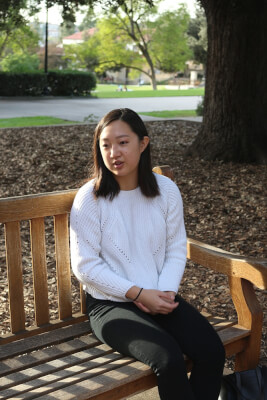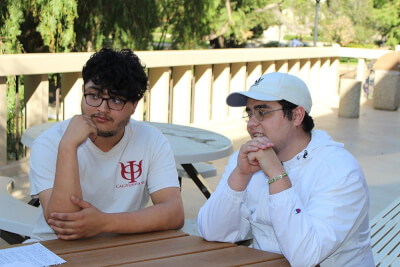
The fourth installment of People of Color (POC) Formal is scheduled for Dec. 4 at The Globe Theatre in downtown Los Angeles. Behind the scenes, according to POC Formal planning committee member Elías Magaña (senior), the committee has been working all semester to plan the highly anticipated event. Other committee members include Mario Lemus (senior), Katrina Weti (first year), Jason Park (first year), Zulema Cabrales (first year), Brenda Francia-Jackson (sophomore), Antonio Quadra (sophomore) and Taylor Billingslea-Fuller (senior). The purpose of POC Formal, according to Weti, is for POC students to come together to celebrate each other’s achievements and unwind. The committee first sent out invitations first to POC-identifying students but invited students are allowed to bring a plus one of any ethnicity or race. The committee gathers names of POC-identifying students by comparing previous years’ guest lists and reaching out to cultural clubs and first years involved in the planning.
According to Magaña, planning this semester’s formal was less taxing than it has been in the past because the committee built on previous committees’ work, instead of building from the ground up. For example, Lemus noted they will continue offering a party bus as they did last semester. On the POC Formal Instagram, the committee is commemorating the work of past organizers. Magaña, who also planned previous POC Formals, said this year, the committee focused on the sustainability of the event.
“Every year the doubt has been, ‘Will this happen?’ and I don’t think it should be that way,” Magaña said. “I want POC Formal to become a tradition or a movement.”
To ensure the event will continue after he graduates, Magaña said the committee wanted to have first years involved in the planning process. Weti and Park joined the committee after hearing about the event during Multicultural Summer Institute (MSI). Park said their job is to spread the word about the Formal and to make sure first years are included on the guest list. While the older members of the committee handled the brunt of the planning, Weti emphasized the need for first years to give input.
“I see it as, if I don’t know how to [plan POC Formal] or learn from them, this isn’t going to happen my senior year,” Weti said.
According to Magaña, in the past, gathering institutional support for the Formal was a struggle. This semester, he said the committee has built more trust with the administration.
“In the previous years, the question was ‘Will [the administration] help us?’ Now it’s more like ‘How will they help us?'” Magaña said.
The committee received funding from the Dean of Students Office, Associated Students of Occidental College (ASOC) Senate, Black Students Alliance (BSA), Latinx Students Organization (LSU) and Hawaii Club. Vice President of Student Affairs and Dean of Students Rob Flot also gave his support for the event.
“Staff in the Dean of Students Office believe that events like the POC Formal support inclusive programming, which meets the needs of a range of students,” Flot said via email.
Lemus attended Greek formals in the past and found them too exclusionary. He said the goal is to make POC Formal as inclusive as possible. There is no entry fee or dress code for the event, according to Lemus.
“We know that formal wear can be expensive and that for people who aren’t on the gender binary, it may be hard as well,” Lemus said. “We want people to wear what makes them feel special and comfortable. It also allows people to wear their traditional or cultural dress and represent their identity in that way.”

Mohi Andrabi (sophomore) is a member of the South Asian Student Association (SASA) and has attended the last two POC Formals. At his first POC Formal, he wore general formal wear and said it felt like a normal school dance. As he became more involved with SASA, Andrabi explained the event felt less like a dance and more like a cultural event.
“It’s a space for people to embrace and fully indulge in their cultural background,” Andrabi said. “In general, on campus, there’s the space to do that, but very often at formal events, you’re not encouraged to wear attire that is bearing ties to your cultural background. It’s usually like a black tie event, but here we can go all out.”
Lynn He (senior) has attended all four POC Formals and noted the event has also developed a fashion reputation where students can express themselves creatively. He, who identifies as Asian, said her POC Formal outfit for this year embraces the color “yellow” in order to reclaim the color. For He, POC Formal is important because it celebrates a diversity of beauty.
“I think it’s necessary because historically a lot of people of color have been excluded from, at least in my head, aesthetics,” He said. “There’s a certain vibe or aesthetic that a lot of these Greek orgs are selecting for and I think those vibes are in some ways conflated with whiteness.”
This is Magaña’s last POC Formal at Occidental. Magaña said he dedicates 10 to 12 hours a week on planning the event, including sending invites, making posts and working with the administration. He hopes students will appreciate the committee’s efforts to plan POC Formal.
“Most people only see the end result, which is a great party, but not the work that went into it,” Magaña said. “I know this sounds cheesy, but it really has been a labor of love.”
![]()






























